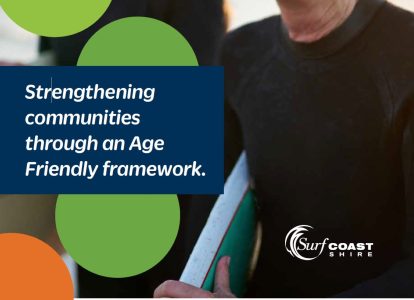Surf Coast Shire Positive Ageing Advisory Committee



Aged Care Reform in Australia over the last several years continues to be a complex and drawn out process creating uncertainty for clients, community and service providers. As an outcome of its Positive Ageing Review Process, Surf Coast Shire decided to take a planned approach that considers current and future service needs of our community. This approach is guided by an advisory committee that represents clients; carers; community and service providers. The role of the Positive Ageing Advisory Committee is to collect and consider evidence, ideas and community input about how Council can best create an Age Friendly Surf Coast where older people are supported and empowered to live well. The Committee represents and advocates on behalf of older people in the community. It also provides input and recommendations into the planning stage of Council strategies, plans and policies which relate to older people. The Positive Ageing Advisory Committee was formed in October 2018 and is comprised of up to eleven community representatives reflecting the diversity of the Shire including gender; cultural diversity and geographic location. In addition, the committee membership includes one Councillor and three Council Officers. The Committee meets bi-monthly. Committee members and Terms of Reference are endorsed by Council. By 2036, the largest cohort in our community will be over 80 years of age. The continuing role of the Committee in providing advice and leadership on the implementation of Council’s Age Friendly Strategy and associated policies and plans will be vital. The slogan, “nothing about us without us” probably best reflects the biggest lesson learned from this age-friendly practice
Website: https://www.surfcoast.vic.gov.au/Community/Over-55s/Positive-Ageing-Advisory-Committee
Main target group: Older people in general
Sector(s): Education, Health, Housing, Information and communication, Long-term care, Social protection, Transportation, Urban development
Other sector(s): Civic Participation and Employment; Respect and Social Inclusion; Social Participation
Desired outcome for older people:
Contribute
Other Issues: Advocacy